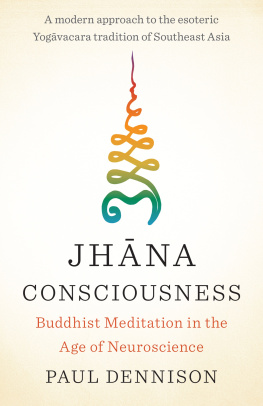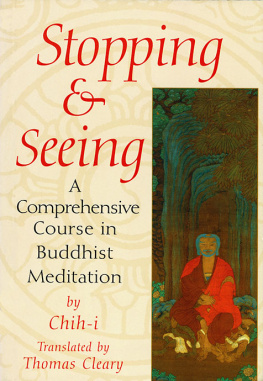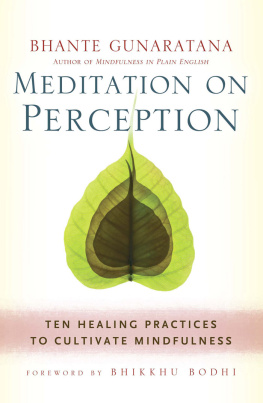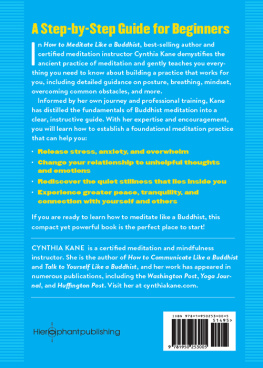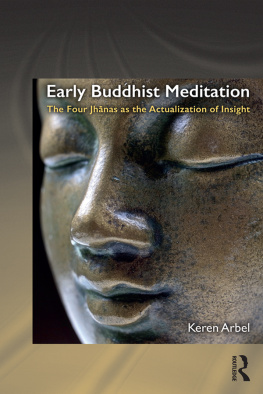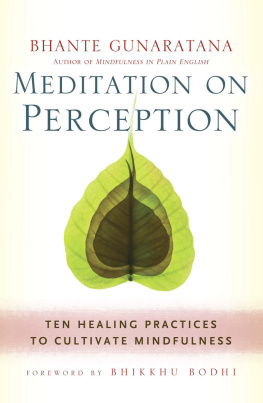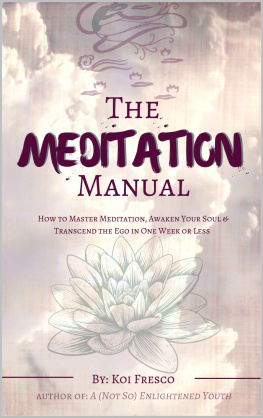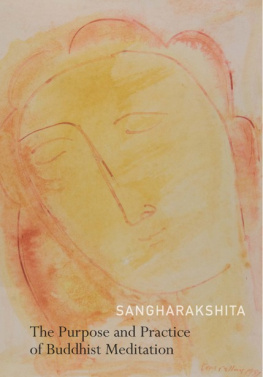Meditation, Buddhism, and Science
Meditation,
Buddhism, and
Science
Edited by
DAVID L. McMAHAN
ERIK BRAUN


Oxford University Press is a department of the University of Oxford. It furthers the Universitys objective of excellence in research, scholarship, and education by publishing worldwide. Oxford is a registered trade mark of Oxford University Press in the UK and certain other countries.
Published in the United States of America by Oxford University Press
198 Madison Avenue, New York, NY 10016, United States of America.
Oxford University Press 2017
All rights reserved. No part of this publication may be reproduced, stored in a retrieval system, or transmitted, in any form or by any means, without the prior permission in writing of Oxford University Press, or as expressly permitted by law, by license, or under terms agreed with the appropriate reproduction rights organization. Inquiries concerning reproduction outside the scope of the above should be sent to the Rights Department, Oxford University Press, at the address above.
You must not circulate this work in any other form and you must impose this same condition on any acquirer.
CIP data is on file at the Library of Congress
ISBN 9780190495800 (pbk.)
ISBN 9780190495794 (hbk.)
ISBN 9780190495824 (epub)
Contents
DAVID L. MCMAHAN and ERIK BRAUN
DAVID L. MCMAHAN
EVAN THOMPSON
WILLIAM EDELGLASS
WILLIAM S. WALDRON
JOANNA COOK
JEFF WILSON
ERIK BRAUN
ROBERT H. SHARF
DAVID MCMAHAN WISHES to acknowledge with gratitude that his work on this volume was completed with help from a Mind & Life Contemplative Studies Fellowship. Any views, findings, conclusions, or recommendations expressed in this publication do not necessarily reflect those of the Mind & Life Institute. He would also like to thank Karen Sattler for her love and support.
Erik Braun would like to acknowledge the institutional support he received to work on this volume from the University of Oklahoma and the University of Virginia. And, above all, he thanks his wife, Britt Wahlin, whose support ensures the very possibility of such work.
Erik Braun is an Associate Professor in the Department of Religious Studies at the University of Virginia. He is the author of The Birth of Insight: Meditation, Modern Buddhism, and the Burmese Monk Ledi Sayadaw (University of Chicago Press, 2013). He focuses primarily on Burmese Buddhism in the nineteenth and early twentieth centuries, though he also works on matters related to Pali literature and to globalizing forms of meditative practice that stem from Burma.
Julia Cassaniti is an Assistant Professor of Medical Anthropology at Washington State University. Her first book, Living Buddhism: Mind, Self, and Emotion in a Thai Community (Cornell University Press), received the American Anthropological Associations 2016 Stirling Prize for Best Published Book in Psychological Anthropology. Dr. Cassaniti examines the social articulations of religious ideas in the psychology of everyday life in Southeast Asia and around the world, with special attention to their implications for health and well-being.
Joanna Cook is an anthropologist at University College London. She is the author of Meditation in Modern Buddhism: Renunciation and Change in Thai Monastic Life (Cambridge University Press, 2010) and the co-editor of The State Were In: Reflecting on Democracys Troubles (Berghan Books, 2016), Detachment: Essays on the Limits of Relational Thinking (Manchester University Press, 2015), and Southeast Asian Perspectives on Power (Routledge, 2012).
William Edelglass is Professor of Philosophy and Director of Environmental Studies at Marlboro College in Vermont. His research is primarily in the areas of Buddhist philosophy, environmental philosophy, and twentieth-century French and German thought. He served as co-director of the International Association of Environmental Philosophy and is now co-editor of the journal Environmental Philosophy. He is also co-editor of Buddhist Philosophy: Essential Readings (Oxford University Press, 2009), The Oxford Handbook of World Philosophy (Oxford University Press, 2014), and Facing Nature: Levinas and Environmental Thought (Duquesne University Press, 2012). He has taught at the Barre Center for Buddhist Studies, a federal prison in New York, a Tibetan refugee settlement in Nepal, and the Institute of Buddhist Dialectics, Dharamsala, India.
David L. McMahan is the Charles A. Dana Professor of Religious Studies at Franklin & Marshall College in Pennsylvania. He is the editor of Buddhism in the Modern World (Routledge, 2012) and author of The Making of Buddhist Modernism (Oxford University Press, 2008), Empty Vision: Metaphor and Visionary Imagery in Mahyna Buddhism (Routledge Curzon, 2002), and a number of articles on Mahyna Buddhism in South Asia and Buddhism in the modern world. He has written on Indian Buddhist literature, visual metaphors and practice, the early history of the Mahyna movement in India, and, more recently, on the interface of Buddhism and modernity, including its interactions with science, psychology, modernist literature, romanticism, and transcendentalism.
Robert H. Sharf is D. H. Chen Distinguished Professor of Buddhist Studies in the Department of East Asian Languages and Cultures and Chair of the Center for Buddhist Studies at the University of California, Berkeley. He works primarily in the area of medieval Chinese Buddhism (especially Chan), but he also publishes in the areas of Japanese Buddhism, Buddhist art, Buddhist philosophy, ritual studies, and methodological issues in the study of religion. He is author of Coming to Terms with Chinese Buddhism: A Reading of the Treasure Store Treatise (University of Hawaii Press, 2002), and co-editor of Living Images: Japanese Buddhist Icons in Context (Stanford University Press, 2001).
Evan Thompson is Professor of Philosophy at the University of British Columbia. He is the author of Waking, Dreaming, Being: Self and Consciousness in Neuroscience, Meditation, and Philosophy (Columbia University Press, 2015) and Mind in Life: Biology, Phenomenology, and the Sciences of Mind (Harvard University Press, 2007). He is also co-author of The Embodied Mind: Cognitive Science and Human Experience (MIT Press, 1991; revised edition 2016).
William S. Waldron has been teaching courses on Buddhism, Hinduism, and the Study of Religion at Middlebury College in Vermont since 1996. He received both his BA in South Asian Studies and PhD in Buddhist Studies from the University of Wisconsin, after working extensively with native scholars in India, Nepal, and Japan, where he continues to do research. His work focuses on Indian Buddhism in general and the Yogcra school in particular. He published a monograph on the Yogcra notion of store-house consciousness (laya-vijna), The Buddhist Unconscious (RoutledgeCurzon, 2003), numerous articles comparing Buddhist and modern theories of mind in evolutionary biology, cognitive science, and sociology, and is currently completing a book on the theory of cognitive constructivism in Indian Yogcra Buddhism.
Jeff Wilson is Associate Professor of Religious Studies and East Asian Studies at Renison University College, University of Waterloo. He is the author of



